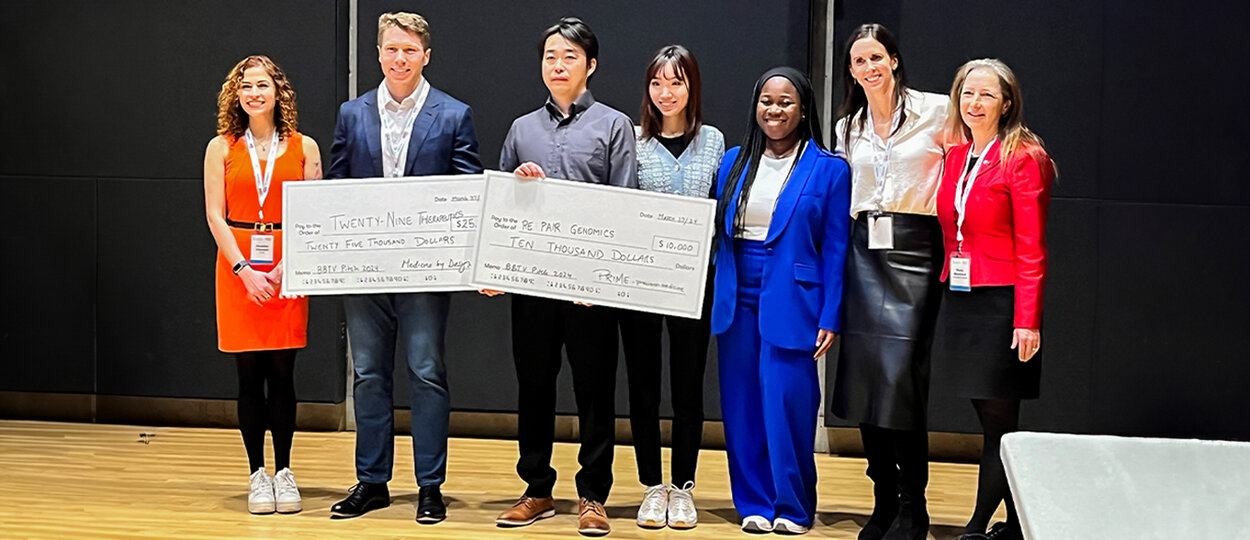A start-up company launched by alumni of the Leslie Dan Faculty of Pharmacy that is developing key components of gene therapy received second place in the recent Building a Biotech Venture pitch competition hosted by U of T’s Medicine By Design, in partnership with the PRiME precision medicine initiative, Health Innovation Hub (H2i), and Talk Boutique.
Re:Pair Genomics, led by a researcher and former students from Professor David Hampson’s lab at the Leslie Dan Faculty of Pharmacy, received the $10,000 prize to help support their work developing essential components for gene therapies.
“We are trying to solve this problem by enhancing the precision of therapeutic gene delivery to the target tissue or cell so that the therapy is safer and more effective.”
“Many trials of gene therapy products fail because they have effects in genes other than their target, which can lead to toxicity in the patient and wastes a lot of time and resources,” says Yosuke Niibori, a senior research associate with Hampson and chief scientific officer of Re:Pair Genomics. “We are trying to solve this problem by enhancing the precision of therapeutic gene delivery to the target tissue or cell so that the therapy is safer and more effective.”
Hampson, a professor at the Leslie Dan Faculty of Pharmacy, leads research focused on using gene therapy delivered with specialized viruses to treat neurodevelopmental disorders such as Fragile X syndrome and Dravet syndrome.
As a senior research associate in Hampson’s lab, Niibori is working on developing gene therapy promoters, sequences of genetic material that are essential to direct the gene therapy to the target tissue or cell. Niibori realized that many biotech companies developing gene therapy needed assistance with creating promoters tailored to their specific targets and thought there could be a viable business opportunity.
Niibori says that when he began his research, it could take many months to develop and test one promoter, making it a time-consuming and expensive process. In Re:Pair Genomics, he has developed machine learning algorithms that would allow him to design candidate promoters for gene therapy development more quickly.
He also built a team of U of T alumni from Hampson’s lab to launch the start-up, Re:Pair Genomics. Its leadership team includes CEO Shiron Lee, a former master’s student in Hampson’s lab, chief development officer Luca Hategan, a former undergraduate student in the Hampson lab now pursuing a master’s degree in the department of cellular and systems biology at U of T Mississauga with Brandon Walters, and chief operations officer Swapna Prakash, a law student at U of T. With support from Hampson and Walters, the Re:Pair Genomics team will refine the algorithm that would help them design custom promoters to enhance the precision of gene therapy products and select the best candidates in as little as one day.
Pitch competitions provide mentorship and learning opportunities
After the company was formed in 2021, the student leaders began applying for non-dilutive funding, such as grants, and participating in various pitch competitions to try to acquire capital for the business, and they were finalists or winners of several.
Earlier this year, they participated in the Building a Biotech Venture program, hosted by Medicine by Design, PRiME, Health Innovation Hub, and Talk Boutique, which included workshops and mentorship sessions on topics such as building a business, understanding the market, and protecting intellectual property. Niibori says that the experience of participating in the program has been invaluable to receive pitch coaching from innovation expert Paul Santerre (H2i), invited speakers, and Talk Boutique.
“The students received coaching on how to build teams and business models as well as present their pitch . . . that was very useful for the entrepreneurs.”
“It was an incredible experience for the team,” says Niibori. “The students also received coaching on how to build teams and business models as well as present their pitch, and I could see how they were thinking differently about the business and presentation after those sessions, so that was very useful for the entrepreneurs.”
The program culminated in a pitch competition, with Prakash delivering the pitch on behalf of Re:Pair Genomics, which ultimately received second place.
The funds from their most recent prize will help them develop promoters for various cell types and build a dataset that will improve their algorithm and promoter development. In the meantime, they are continuing to participate in further pitch competitions to help build capital for their business.
“We are collaborating with academia and industry to conduct the validation studies needed to move our service forward,” says Niibori. “It’s an exciting time to be in biotech entrepreneurship and to work with these talented students to build this company from the ground up.”
More News
Image

Dean Lisa Dolovich reappointed for second term
Professor Lisa Dolovich has been reappointed for a second term as Dean of the Leslie Dan Faculty of Pharmacy, University of Toronto, effective July 1, 2025, to December 30, 2030.
Read More
Image

Pharmacy Summer Camp gives high school students insight into pharmacy profession
A new summer camp based at the faculty will give high school students a range of experiences in pharmacy and pharmaceutical sciences.
Read More
Image

Team GloveLift wins 2025 Business Plan Competition with innovative medical device
PharmD students win $5,000 prize for their innovative medical device concept aimed at improving patient care.
Read More
